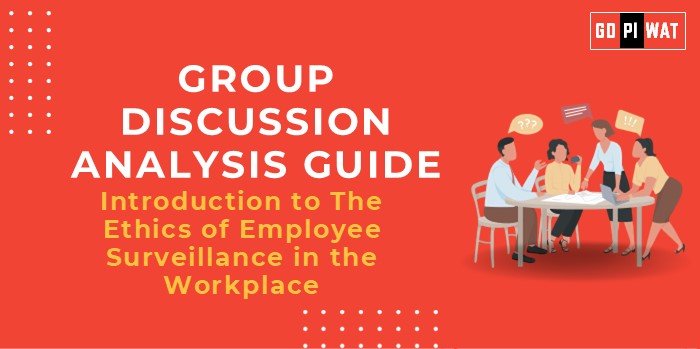📋 Group Discussion Analysis Guide
🌐 Introduction to The Ethics of Employee Surveillance in the Workplace
Opening Context: “With remote work and hybrid models becoming the norm post-pandemic, workplace surveillance has surged globally. Businesses argue it enhances productivity, but ethical concerns around privacy and trust persist, making this a pressing topic for B-school aspirants.”
Topic Background: Employee surveillance—monitoring work activity, emails, and attendance—dates back decades. The rise of advanced tools like AI-driven tracking software and facial recognition systems has escalated debates on ethics, boundaries, and transparency. The balance between business efficiency and employee autonomy is at the core of this discussion.
📊 Quick Facts and Key Statistics
- Global Employee Monitoring Software Market: Valued at $1.1 billion in 2023, projected to grow at 11.8% CAGR by 2030. (Grand View Research)
- Adoption Rates: 60% of large companies use surveillance tools to monitor employees. (Gartner, 2023)
- Productivity Impact: A Microsoft survey revealed 80% of employees felt “watched,” impacting trust.
- Legal Framework: The EU’s GDPR and California’s CCPA have stricter employee monitoring regulations, compared to emerging economies.
- Remote Work Trends: 74% of companies globally report higher surveillance in remote work settings.
👥 Stakeholders and Their Roles
- Employers: Implement surveillance tools to optimize productivity, reduce misconduct, and assess performance.
- Employees: Affected by surveillance, raising concerns about privacy invasion, stress, and autonomy loss.
- Tech Companies: Develop advanced surveillance software for the market, influencing data usage policies.
- Government Bodies: Regulate employee privacy laws to balance ethical surveillance practices.
- Labor Unions and NGOs: Advocate for workers’ rights, ethical boundaries, and legal protections.
🏆 Achievements and Challenges
Achievements
- Enhanced Productivity: Tools like time-tracking and keylogging help identify workflow inefficiencies.
- Performance Measurement: Employers gain objective performance data to reward top performers.
- Mitigation of Misconduct: Monitoring helps detect unethical behavior, such as data theft.
- Improved Remote Work Management: Surveillance tools ensure accountability in distributed teams.
Challenges
- Privacy Violation: Constant monitoring breaches employees’ personal and professional boundaries.
- Trust Erosion: Surveillance fosters a culture of distrust, reducing morale and creativity.
- Legal Gaps: In countries without clear regulations, employees are vulnerable to misuse of data.
Global Comparisons
- Europe: GDPR mandates transparency and consent for surveillance, fostering ethical monitoring practices.
- USA: Surveillance laws vary by state, with tools like Hubstaff and Teramind widely adopted.
- China: Widespread use of AI surveillance often prioritizes productivity over privacy concerns.
Case Study
Amazon’s Monitoring Practices: Amazon tracks warehouse workers’ movements and productivity with real-time systems. While efficient, it has sparked criticism for increasing stress and depersonalizing work.
📚 Structured Arguments for Discussion
- Supporting Stance: “Employee surveillance, when implemented transparently, boosts productivity and ensures accountability, especially in remote work environments.”
- Opposing Stance: “Workplace surveillance undermines trust, increases stress, and violates ethical boundaries, stifling innovation.”
- Balanced Perspective: “Surveillance tools can improve efficiency but require strong legal frameworks and transparent practices to ensure fairness.”
🔑 Effective Discussion Approaches
- Opening Approaches:
- “With 60% of companies now using surveillance tools, are we prioritizing productivity at the cost of privacy?”
- “The GDPR framework offers lessons on balancing employee monitoring with ethical considerations.”
- Counter-Argument Handling:
- For Productivity Concerns: “While tools may improve productivity, studies show employees under heavy monitoring experience burnout, impacting long-term performance.”
- On Privacy: “Transparent policies and consent-driven monitoring can balance both ethical concerns and business goals.”
🌟 Strategic Analysis of Strengths and Weaknesses
- Strengths: Boosts efficiency and accountability, reduces unethical behavior.
- Weaknesses: Increases stress and distrust, lacks legal clarity in many regions.
- Opportunities: Develop ethical monitoring frameworks, integrate AI tools for non-invasive productivity insights.
- Threats: Potential for misuse of data, employee pushback and legal battles.
📈 Connecting with B-School Applications
- Real-World Applications:
- Integrating AI-driven performance monitoring tools for internships or organizational behavior projects.
- Researching global regulatory frameworks on workplace privacy laws.
- Sample Interview Questions:
- “How can companies ethically balance productivity and employee privacy?”
- “Discuss the implications of AI-based surveillance on workplace culture.”
- Insights for B-School Students:
- Understanding the role of ethical frameworks in management practices.
- Balancing technological advancements with people-centric leadership.


